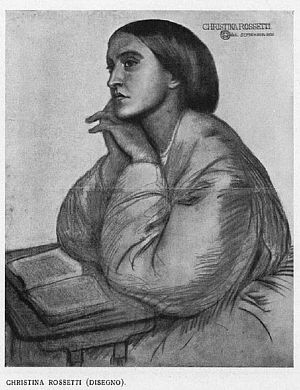
Reading about the Rossetti has opened by eyes to a whole period of art which I find to fascinate me - Christina and her brothers William and Dante were privileged and educated, however they lived a rather bohemian lifestyle in a time where class distinction was rife.
Before my attention is diverted, I wanted to share another of Christina’s poems which for some reason makes sense to me. I tend to overthink – do I love my partner too much, or does he? Is it healthy? Are we perfectly complementary or are we two peas in a pod? Should our love be tempestuous and fill of passion and spark – or should it be a slow burner: a warm flame in the cockles of our souls?
And then, the questions that have the threat of greater implications – do we still love each other, or has our romance evolved into familiarity and hence a security blanket? Am I delusional in feeling that he is the only one I could be with for the rest of my life? Logic tells me that fate had nothing to do with finding him – that I could find the same happiness and contentment with another. But when I am with him, it is so difficult to believe that he wasn’t created especially for me: his grin, his giggle, his protectiveness, his shyness, his slow willingness in trying to understand the things I enjoy.
By Christina Rossetti 1830–1894
Poca favilla gran fiamma seconda. – Dante
Ogni altra cosa, ogni pensier va fore,
E sol ivi con voi rimansi amore. – Petrarca
I loved you first: but afterwards your love
Outsoaring mine, sang such a loftier song
As drowned the friendly cooings of my dove.
Which owes the other most? my love was long,
And yours one moment seemed to wax more strong;
I loved and guessed at you, you construed me
And loved me for what might or might not be –
Nay, weights and measures do us both a wrong.
For verily love knows not ‘mine’ or ‘thine;’
With separate ‘I’ and ‘thou’ free love has done,
For one is both and both are one in love:
Rich love knows nought of ‘thine that is not mine;’
Both have the strength and both the length thereof,
Both of us, of the love which makes us one.
Her poem above, I believe, cautions the reader to not compare the way in which we express our love to each other – but rather to have trust in love – that we have an innate ability to cater to each other’s emotional requirements. My partner doesn’t express his love with words very easily – he says he loves me, and I know he does – but he doesn’t reply to my attempts at love letters or my sending of poetry that I find poignant. I get disappointed. But he is the man who used his entire first paycheck to buy me a watch that he thought I would use, he buys socks for me because my feet freeze, he holds me tightly when I cry and he pitches up at my workplace to work unpaid when my workload is too high. Maybe I am more flamboyantly romantic – maybe he is more practically minded. Maybe in the end it actually doesn’t make a difference because together – it’s perfect (…well most of the time).
